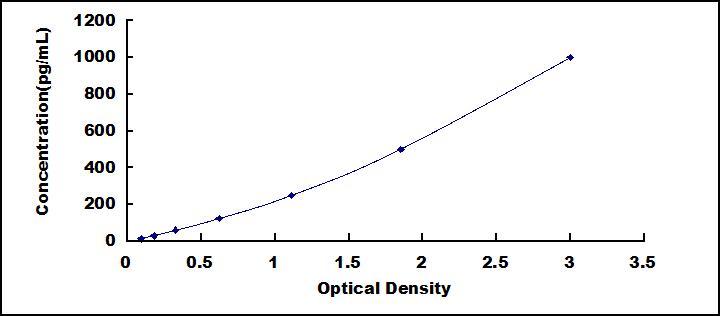Packages (Simulation)

Reagent Preparation

Image (I)
Image (II)
Certificate


High Sensitive ELISA Kit for Vascular Endothelial Growth Factor Receptor 2 (VEGFR2)
CD309; FLK1; VEGFR; KDR; A Type III Receptor Tyrosine Kinase; Kinase Insert Domain Receptor; Kinase Insert Domain Receptor; Fetal Liver Kinase-1
- Product No.HEB367Hu
- Organism SpeciesHomo sapiens (Human) Same name, Different species.
- Sample TypeSerum, plasma, tissue homogenates and other biological fluids
- Test MethodDouble-antibody Sandwich
- Assay Length3h
- Detection Range15.6-1,000pg/mL
- SensitivityThe minimum detectable dose of this kit is typically less than 5.8pg/mL.
- DownloadInstruction Manual
- UOM 48T96T 96T*5 96T*10 96T*100
- FOB
US$ 512
US$ 732
US$ 3294
US$ 6222
US$ 51240
For more details, please contact local distributors!
Specificity
This assay has high sensitivity and excellent specificity for detection of High Sensitive Vascular Endothelial Growth Factor Receptor 2 (VEGFR2).
No significant cross-reactivity or interference between High Sensitive Vascular Endothelial Growth Factor Receptor 2 (VEGFR2) and analogues was observed.
Recovery
Matrices listed below were spiked with certain level of recombinant High Sensitive Vascular Endothelial Growth Factor Receptor 2 (VEGFR2) and the recovery rates were calculated by comparing the measured value to the expected amount of High Sensitive Vascular Endothelial Growth Factor Receptor 2 (VEGFR2) in samples.
| Matrix | Recovery range (%) | Average(%) |
| serum(n=5) | 78-96 | 91 |
| EDTA plasma(n=5) | 94-101 | 97 |
| heparin plasma(n=5) | 83-92 | 88 |
Precision
Intra-assay Precision (Precision within an assay): 3 samples with low, middle and high level High Sensitive Vascular Endothelial Growth Factor Receptor 2 (VEGFR2) were tested 20 times on one plate, respectively.
Inter-assay Precision (Precision between assays): 3 samples with low, middle and high level High Sensitive Vascular Endothelial Growth Factor Receptor 2 (VEGFR2) were tested on 3 different plates, 8 replicates in each plate.
CV(%) = SD/meanX100
Intra-Assay: CV<10%
Inter-Assay: CV<12%
Linearity
The linearity of the kit was assayed by testing samples spiked with appropriate concentration of High Sensitive Vascular Endothelial Growth Factor Receptor 2 (VEGFR2) and their serial dilutions. The results were demonstrated by the percentage of calculated concentration to the expected.
| Sample | 1:2 | 1:4 | 1:8 | 1:16 |
| serum(n=5) | 98-105% | 88-97% | 95-104% | 86-101% |
| EDTA plasma(n=5) | 91-98% | 92-104% | 83-97% | 97-104% |
| heparin plasma(n=5) | 84-98% | 82-101% | 90-101% | 80-99% |
Stability
The stability of kit is determined by the loss rate of activity. The loss rate of this kit is less than 5% within the expiration date under appropriate storage condition.
To minimize extra influence on the performance, operation procedures and lab conditions, especially room temperature, air humidity, incubator temperature should be strictly controlled. It is also strongly suggested that the whole assay is performed by the same operator from the beginning to the end.
Reagents and materials provided
| Reagents | Quantity | Reagents | Quantity |
| Pre-coated, ready to use 96-well strip plate | 1 | Plate sealer for 96 wells | 4 |
| Standard | 2 | Standard Diluent | 1×20mL |
| Detection Reagent A | 1×120µL | Assay Diluent A | 1×12mL |
| Detection Reagent B | 1×120µL | Assay Diluent B | 1×12mL |
| TMB Substrate | 1×9mL | Stop Solution | 1×6mL |
| Wash Buffer (30 × concentrate) | 1×20mL | Instruction manual | 1 |
Assay procedure summary
1. Prepare all reagents, samples and standards;
2. Add 100µL standard or sample to each well. Incubate 1 hours at 37°C;
3. Aspirate and add 100µL prepared Detection Reagent A. Incubate 1 hour at 37°C;
4. Aspirate and wash 3 times;
5. Add 100µL prepared Detection Reagent B. Incubate 30 minutes at 37°C;
6. Aspirate and wash 5 times;
7. Add 90µL Substrate Solution. Incubate 10-20 minutes at 37°C;
8. Add 50µL Stop Solution. Read at 450nm immediately.
GIVEAWAYS
INCREMENT SERVICES
| Magazine | Citations |
| APMIS | Peritumoral brain edema in angiomatous supratentorial meningiomas: an investigation of the vascular endothelial growth factor A pathway PubMed: 23398358 |
| Acta Biomater | Antioxidant and bone repair properties of quercetin-functionalized hydroxyapatite: an in vitro osteoblast-osteoclast-endothelial cell co-culture study PubMed: 26689470 |
| Acta Biomaterialia | Antioxidant and bone repair properties of quercetin-functionalized hydroxyapatite: An in vitro osteoblast–osteoclast–endothelial cell co-culture study Pubmed:26689470 |
| Journal of Cellular Physiology | A Human 3D In Vitro Model to Assess the Relationship Between Osteoporosis and Disseminationto Bone of Breast Cancer Tumor Cells. pubmed:27925188 |
| Regenerative Biomaterials | The directional migration and differentiation of mesenchymal stem cells toward vascular endothelial cells stimulated by biphasic calcium phosphate ceramic 10.1093/rb/rbx028 |
| International Journal of Immunopathology and Pharmacology | VEGF-R2 and TNF-R1 expression and cytokine production by samples of mammary adenocarcinomas and correlations with histopathological parameters of these … Pubmed:29985074 |
| JOURNAL OF DERMATOLOGICAL TREATMENT | Effect of isotretinoin (13-cis-retinoic acid) on levels of soluble VEGF receptors (sVEGFR1, sVEGFR2, sVEGFR3) in patients with acne vulgaris Pubmed: 32043381 |
| Journal of Genetic Engineering and Biotechnology | Encapsulated VEGF 121-PLA microparticles promote angiogenesis in human endometrium stromal cells 33523322 |
| Mol Cell Biochem | Intuitive repositioning of an anti-depressant drug in combination with tivozanib: precision medicine for breast cancer therapy 34324118 |
| BMC Nephrol | Effect of subacute poisoning with lambdacyhalothrin on vascular endothelial growth factor 2 receptor in mice kidneys Pubmed:35643467 |













